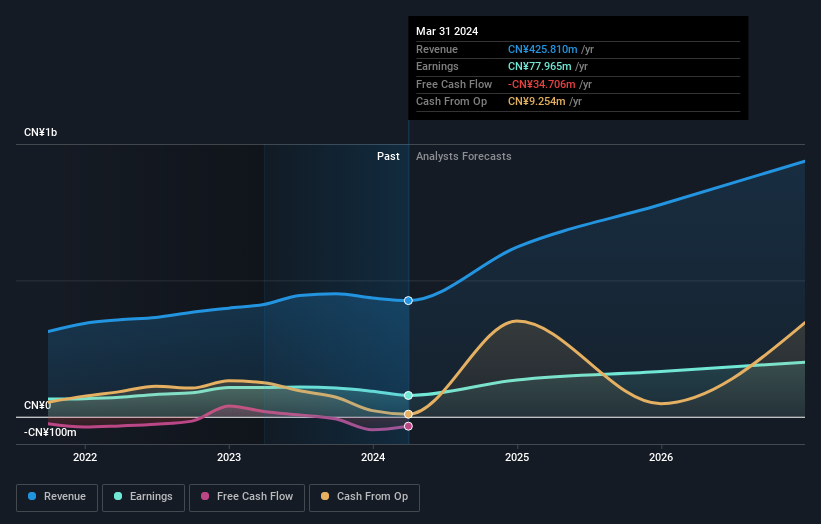Stock Analysis
Sino-High (China) Co., Ltd.'s (SZSE:301076) most bullish insider is CEO Liuxin Yan, and their holdings value went up by 14% last week

Key Insights
- Insiders appear to have a vested interest in Sino-High (China)'s growth, as seen by their sizeable ownership
- 50% of the business is held by the top 3 shareholders
- Institutions own 13% of Sino-High (China)
Every investor in Sino-High (China) Co., Ltd. (SZSE:301076) should be aware of the most powerful shareholder groups. With 59% stake, individual insiders possess the maximum shares in the company. That is, the group stands to benefit the most if the stock rises (or lose the most if there is a downturn).
As a result, insiders scored the highest last week as the company hit CN¥3.3b market cap following a 14% gain in the stock.
Let's take a closer look to see what the different types of shareholders can tell us about Sino-High (China).
Check out our latest analysis for Sino-High (China)

What Does The Institutional Ownership Tell Us About Sino-High (China)?
Institutional investors commonly compare their own returns to the returns of a commonly followed index. So they generally do consider buying larger companies that are included in the relevant benchmark index.
Sino-High (China) already has institutions on the share registry. Indeed, they own a respectable stake in the company. This implies the analysts working for those institutions have looked at the stock and they like it. But just like anyone else, they could be wrong. When multiple institutions own a stock, there's always a risk that they are in a 'crowded trade'. When such a trade goes wrong, multiple parties may compete to sell stock fast. This risk is higher in a company without a history of growth. You can see Sino-High (China)'s historic earnings and revenue below, but keep in mind there's always more to the story.

Hedge funds don't have many shares in Sino-High (China). With a 26% stake, CEO Liuxin Yan is the largest shareholder. For context, the second largest shareholder holds about 19% of the shares outstanding, followed by an ownership of 5.2% by the third-largest shareholder. Interestingly, the second-largest shareholder, Cui'e Qin is also Senior Key Executive, again, pointing towards strong insider ownership amongst the company's top shareholders.
A more detailed study of the shareholder registry showed us that 3 of the top shareholders have a considerable amount of ownership in the company, via their 50% stake.
While studying institutional ownership for a company can add value to your research, it is also a good practice to research analyst recommendations to get a deeper understand of a stock's expected performance. While there is some analyst coverage, the company is probably not widely covered. So it could gain more attention, down the track.
Insider Ownership Of Sino-High (China)
The definition of company insiders can be subjective and does vary between jurisdictions. Our data reflects individual insiders, capturing board members at the very least. Company management run the business, but the CEO will answer to the board, even if he or she is a member of it.
I generally consider insider ownership to be a good thing. However, on some occasions it makes it more difficult for other shareholders to hold the board accountable for decisions.
Our information suggests that insiders own more than half of Sino-High (China) Co., Ltd.. This gives them effective control of the company. That means they own CN¥2.0b worth of shares in the CN¥3.3b company. That's quite meaningful. Most would be pleased to see the board is investing alongside them. You may wish todiscover (for free) if they have been buying or selling.
General Public Ownership
The general public, who are usually individual investors, hold a 28% stake in Sino-High (China). While this group can't necessarily call the shots, it can certainly have a real influence on how the company is run.
Next Steps:
While it is well worth considering the different groups that own a company, there are other factors that are even more important. For example, we've discovered 2 warning signs for Sino-High (China) (1 makes us a bit uncomfortable!) that you should be aware of before investing here.
But ultimately it is the future, not the past, that will determine how well the owners of this business will do. Therefore we think it advisable to take a look at this free report showing whether analysts are predicting a brighter future.
NB: Figures in this article are calculated using data from the last twelve months, which refer to the 12-month period ending on the last date of the month the financial statement is dated. This may not be consistent with full year annual report figures.
Valuation is complex, but we're helping make it simple.
Find out whether Sino-High (China) is potentially over or undervalued by checking out our comprehensive analysis, which includes fair value estimates, risks and warnings, dividends, insider transactions and financial health.
View the Free AnalysisHave feedback on this article? Concerned about the content? Get in touch with us directly. Alternatively, email editorial-team (at) simplywallst.com.
This article by Simply Wall St is general in nature. We provide commentary based on historical data and analyst forecasts only using an unbiased methodology and our articles are not intended to be financial advice. It does not constitute a recommendation to buy or sell any stock, and does not take account of your objectives, or your financial situation. We aim to bring you long-term focused analysis driven by fundamental data. Note that our analysis may not factor in the latest price-sensitive company announcements or qualitative material. Simply Wall St has no position in any stocks mentioned.
About SZSE:301076
Sino-High (China)
Engages in the research and development, production, and sale of aromatic ketone products in China and internationally.
Flawless balance sheet with high growth potential.

